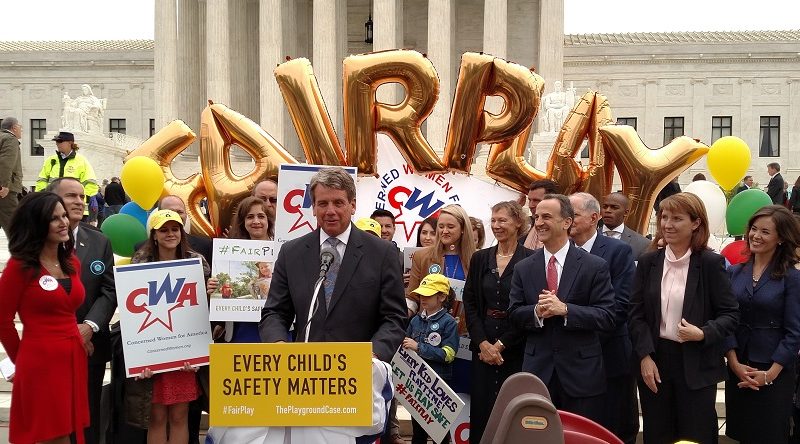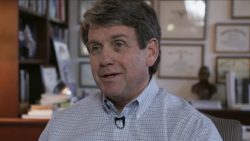While the U.S. Supreme Court heard oral arguments in a case with a potentially far-reaching impact on church-state separation on Wednesday morning, Religious Right leaders held a press conference on the sidewalk outside, where they exuded a hopeful confidence. “I personally am very glad that Justice Neil Gorsuch is sitting on that court today,” said political operative Ralph Reed.
Reed wasn’t the only one grateful to have Gorsuch on the Supreme Court. Rep. Trent Franks, R-Ariz., wasn’t there in person, but sent a statement saying, “It seems as if heaven itself has arranged the passing of the baton” from the late Justice Antonin Scalia to Gorsuch.
The case before the Court was brought by a religious school in Missouri that had applied under a state grant program to have its playground given a rubberized surface made from recycled tires; the school’s application was rejected by officials who cited a state constitutional ban on support for churches and religious institutions, including a specific prohibition against funding to help or sustain a religious school. The school and its Religious Right backers say that’s taking the principle of church-state separation too far and amounts to discrimination against religious people.
The press conference was staged to highlight the playground issue: adorable kids sat on a plastic slides and old tires and held signs promoting the hashtag #fairplay. But as the speakers made clear, Religious Right leaders are interested in far more than whether one particular playground gets a safer surface. They hope the justices will use the case to overturn so-called “Blaine amendments,” provisions in more than 30 state constitutions that prohibit direct aid to churches or religious schools. Those provisions have often served as an impediment to the powerful political movement that seeks to divert public education funds into religious schools under the banner of “school choice.” Hillary Byrnes, assistant general counsel for the U.S. Conference of Catholic Bishops, said a victory in this case could mean “good things for the school choice movement in our country.”
The press conference was organized by Concerned Women for America and emceed by CWA’s Penny Nance. Among the speakers at the press conference during and following the oral argument were Focus on the Family’s Tim Goeglein, the Alliance Defending Freedom’s Mike Farris, and representatives of the U.S. Conference of Catholic Bishops as well as Christian schooling and medical groups. Reps. Bob Goodlatte, R-Va., and Vicky Hartzler, R-Mo., also sent spokespeople.
Nearly every speaker used some variation of what must be their top-testing talking point: “We’re not here to ask for special privileges, but for equal treatment under the law.” Of course, many of these same groups are actively demanding that religious organizations be given the “special privilege” of being able to take public funds without having to abide by nondiscrimination laws or other regulations they say violate their religious beliefs. And many are aggressively trying to deny LGBTQ Americans equal treatment under the law.
Several speakers argued that the Missouri ban on religious institutions getting access to taxpayer dollars is treating people of faith as second-class citizens. Several warned of a slippery slope in which communities would stop providing police or fire protection to churches. “Stop discriminating against us!” yelled Patrick Mahoney, director of the Christian Defense Coalition and the pastor of a Washington, D.C. church. “Stop being bigoted toward us!”
The speakers’ desire to focus public attention on the specific facts of the case, and deride the idea that fixing up a playground that is open to the public was somehow implicating Missouri in an establishment of religion, sometimes conflicted with the broader agenda of the assembled groups. That’s how we ended up with head-scratching statements like one from Goeglein, who said, “This case at the end of the day is about conscience.”
ADF attorneys said they were happy with the oral argument, and some other analysts have suggested that the school could win over some of more moderate justices on the argument that it is unconstitutional to restrict religious institutions from accessing certain public safety or health benefits. It is possible that the Supreme Court could give the school a win on that question without taking a cudgel to state constitutions. It is also possible that the justices could decide the issue is moot now that the Missouri governor has changed the policy and given the school what it was seeking from the Supreme Court.








